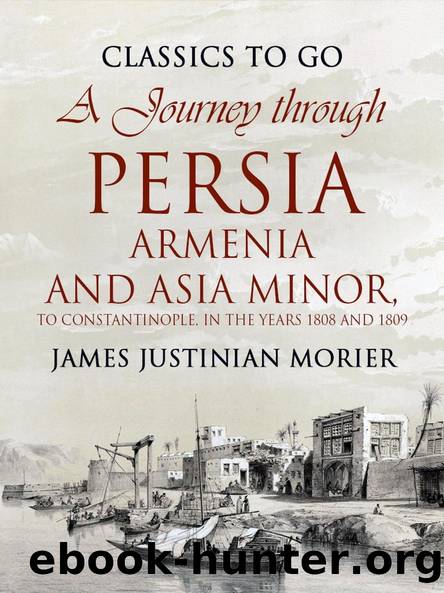A Journey through Persia, Armenia, and Asia Minor, to Constantinople, in the Years 1808 and 1809 by James Justinian Morier

Author:James Justinian Morier [Morier, James Justinian]
Language: eng
Format: epub
ISBN: 9783752420159
Barnesnoble:
Publisher: Outlook Verlag
Published: 2020-08-08T00:00:00+00:00
The aggregate of the population of Persia is divided into tribes, part of which live in fixed habitations, and others (the larger proportion indeed, and all the Arabs) live in tents. These tribes never emigrate from their own districts, but all have their winter and summer regions; in the former pitching their tents in the plain, in the latter on the summits and declivities of their mountains. To these districts they adhere strictly, as the line of demarcation for the pasturage of their flocks has been observed from ages the most remote. Each has its records, and can trace its genealogy to the first generation. The most considerable and renowned are the Baktiar, that spread themselves over the province of Irauk; the Failee, that live about the mountains of Shooster or Susa, and extend their frontiers to those of the Baktiars; the Affshars, that live near the lake of Shahee; the Lacs, that are near Casvin.
All the tribes pay tribute. When the King calls upon them for purposes of war, all (excepting the Arabs and the Failee tribe) are obliged to send a proportion of men, who are always ready at his summons.
The names of every one of such men, the names of their fathers, and other particulars of their family, are all registered in the Defter Khona at the seat of government; and at the feast of the Norooz, they attend the King to inquire whether their services for that year are required: if required, they wait the encampment of his Majesty; if not, they are permitted to return, but in either case they receive a stated pay. This is one of the oldest customs in Persia, recorded in their histories from time immemorial. Each tribe has its chief, who is always a Khan, and one of their own race. He generally remains with his people, and has a Vakeel at the capital, who attends daily at the Der-a-Khonéh, and transacts all the business of his principal. He would be the Baron of feudal times, if he were not liable to lose his post at the will of the King. Mr. Bruce informed me that there still exists in Persia an ancient custom, in cases of emergency, of requiring from every mill (the wheel of which is turned by water) a man and horse armed and accoutred for the field; and of these they reckon one hundred thousand. The reason assigned for the Kingâs never requiring the attendance of the Failees on his military expeditions is, that in time of old (some say the reign of the famous King Caioum) the Failees fled and lost the battle; and incurred upon themselves and their posterity this interdiction of military service for ever. The people of Ispahan and of Kashan, who either urged or joined the flight of the Failees, were included in the same prohibition; and to this day bear the epithet of arrant cowards, more happy perhaps to live a quiet life at home, than to attempt to regain the reputation of brave men by fighting abroad.
Download
This site does not store any files on its server. We only index and link to content provided by other sites. Please contact the content providers to delete copyright contents if any and email us, we'll remove relevant links or contents immediately.
Complete Works of John Buchan by John Buchan(378)
A FIGHTING MAN OF MARS by Edgar Rice Burroughs(365)
Prisoners of War in Britain 1756 to 1815 by Francis Abell(342)
Arsene Lupin vs. Herlock Sholmes by Maurice Leblanc(312)
Ireland In The New Century by Plunkett Horace Curzon Sir(303)
Hotwife Rescued--A Wife Sharing Multiple Partner Wife Watching Hotwife Romance Novel by Karly Violet(284)
The Frontiers of Language and Nationality in Europe by Leon Dominian(273)
Lord Palmerston by Anthony Trollope(272)
The Amateur Diplomat by Hugh S. Eayrs & Thomas B. Costain(269)
BY Anthony Trollope - The life of cicero . vol. 1 by 1881(262)
Boris Karloffâs Favorite Horror Stories by Boris Karloff(256)
Scraps by Jane Austen(249)
The Life of Jesus Critically Examined by Dr. David Friedrich Strauss by George Eliot--Delphi Classics (Illustrated) by George Eliot(240)
Delphi Works of Sir Arthur Conan Doyle (Illustrated) by Sir Arthur Conan Doyle(229)
Siegfried and The Twilight of the Gods: The Ring of the Niblung II by Wagner Richard;(209)
Mr. Surprise Daddy: An Accidental Pregnancy Romance (Love, Accidentally) by Annabelle Love(208)
A Journey through Persia, Armenia, and Asia Minor, to Constantinople, in the Years 1808 and 1809 by James Justinian Morier(179)
The Thousand and One Days by Miss (Julia) Pardoe(179)
The First Book of Farming by C. L. (Charles Landon) Goodrich(176)
